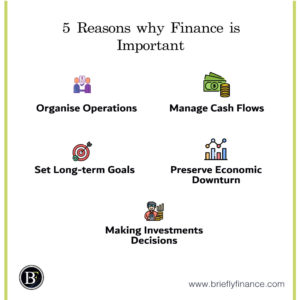Finance is, without question, one of the most crucial parts of a company. With large sums of money, a constant flow of cash, and ongoing transactions, controlling and tracking all of the aforementioned is essential.
Finance has a significant impact on decision-making. For example, if the organisation has more money, a portion of them can be invested, and if the organisation’s finances are fewer than the threshold level, it’s critical to cut back on needless expenditure.
Finance, in particular, aids the company in determining what to spend, where to spend, and when to spend. In addition, it provides a clearer picture of the organisation’s financial situation and a breakdown of its financial operations.

Attribution: The icons has been designed using resources from Flaticon.com
In this post, we will look at the reasons why finance is important.
5 Reasons why Finance is Important
1. Organise Operations
Every day, businesses produce tremendous sums of money. This Money will be used to delegate funds, pay bills, invest in numerous engagements, and keep track of everything. Therefore, it’s essential to keep track of money coming in and out of your business. In the absence of those as mentioned above, it becomes challenging to distribute finances efficiently and effectively. Not to mention the fact that an unreliable cash flow might render a company bankrupt.
2· Manage Cash Flows
Possessing an excessive amount of money is just as detrimental as keeping an insufficient amount. It is necessary to control cash flow for an organisation to continue with its day-to-day operations. If you have more money than you need, it’s an indication that you’re wasting it. Investing in significant engagements and putting extra funds to work would generate higher returns and assist an organisation to develop its business.
3. Set Long-term Goals
Organisations strive to expand and scale their businesses to new heights. To do so, the organisation must have substantial long-term goals that it hopes to achieve in the next five to 10 years. Finance aids an organisation’s success in achieving its objectives. For example, consider the fact that you intend to extend your company to 3 new cities. You run out of money while putting the plan into action. If you had handled your organisation’s finances first and then executed, none of this would have happened. Pre-planning and working with the organisation’s existing funds helps you avoid future crises while still moving forward toward your goals.
4. Preserve Economic Downturn
If you examine an organisation’s growth graph, you will never discover one that grows in a straight line or without curves. Instead, the cycle of a business is a mixture and blend of ups and downs that can occur for various reasons. Recessions, depressions, booms, and failures all have a role in a business’s downfall.
It is simpler for an organisation to go along the business cycle if it has enough money and good financial management. They are always prepared to face the problem & endure the repercussions, regardless of how terrible the situation is. They are never threatened with closing down. Financial management strategies that are fail-proof enable the business to survive even in the face of adversity.
5. Making Investments Decisions
You’ll utilise company finance to assess the benefits and drawbacks of various repayment alternatives when making capital investment purchases. For example, assume you had a choice between such a lower-interest loan with such a high monthly payment as well as a short payback duration and a higher-interest loan with lower monthly payments but a longer repayment period. Of course, if you have the cash flow to pay for it, a lower-interest alternative is the ideal option. However, if your cash flow is limited and the equipment update would save you sufficient Money to cover some additional interest, the alternative with greater good as well as a lower monthly payment may be preferable. Lower costs improve cash flow, and excellent cash flow allows you to capitalise on possibilities.
There is no one-size-fits-all method for weighing all of the expenses and advantages of a long-term loan. Instead, you’ll probably make a good choice if you evaluate all of the ways that even a purchase will influence your income and spending rather than just the interest rate.
The value of cash you spend and how it changes owing to inflation is another factor that will impact the long-term expenses and benefits of a transaction. Because the value of money depreciates with time, when you make loan payments, you’ll utilise capital that is valued less than the capital you borrowed. Accountants and financial professionals use the “return on investment” method to compute all of the measurable advantages an investment will provide overtime and compare those benefits to the overall cost.
Final Thoughts
Having stated all of this, Money is the lifeblood of a business and finance can help you make informed decisions regarding cash flow and long-term funding strategy. As a result, you’ll enhance your company’s financial performance and expand your potential for embracing new possibilities as you acquire skills and methods for utilising the cash you have and for getting extra capital when needed.
Related Posts:
- 6 Financial Advice I Would Give My Younger Self
- 3 Practical Investing Books You Should Read
- 3 Must Have Value Investing Books for Beginners
Disclaimer: Above links includes affiliate links and at no additional cost to you, I may earn a commission. Know that I only recommend products, tools, services and learning resources I’ve personally used and believe are genuinely helpful, not because of the small commissions I make if you decide to purchase them. Most of all, I would never advocate for buying something that you can’t afford or that you’re not yet ready to implement.

